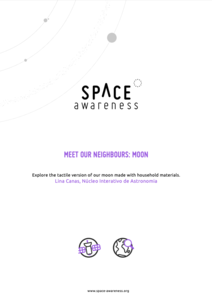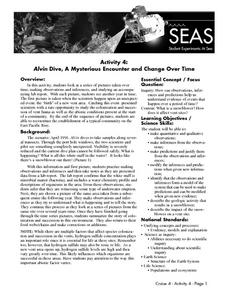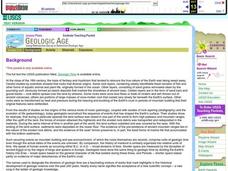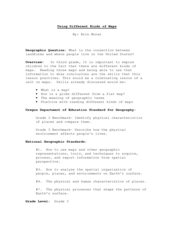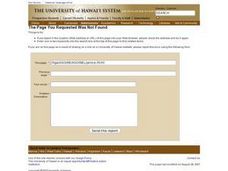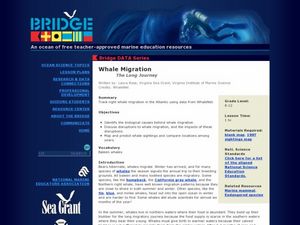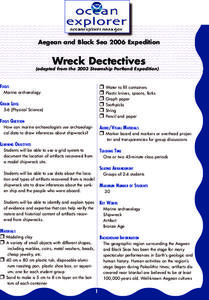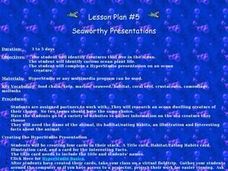Messenger Education
Exploring Exploring
The reason people first began trading was because of their desires for objects other societies possessed. In the activity, classes discuss why exploration has been a common thread in all societies and where these desires have taken...
Polar Trec
Where in the World Is Our Teacher?
Kirk Beckendorf, a middle school teacher, joined researchers at the McMurdo Station in Antarctica to help maintain automatic weather stations. The lesson encourages pupils to track his travels around the region. They connect with the...
Space Awareness
Meet Our Neighbors: Moon
Since a field trip to the moon isn't possible, bring the moon to young astronomers! Participants use everyday materials to create models of the moon and represent the features on its surface. The materials serve as a tactile as well as a...
Curated OER
Activity 4: Alvin Dive, A Mysterious Encounter and Change Over Time
Students receive copies of the Time Series Observations to use for note-taking. They work in small groups to discuss what they see when the outside lights of Alvin are turned on, and off, where the bacteria may have come from. They view...
Curated OER
Plate Tectonics & Land Forms
Fourth graders discuss the different interactions of plates and the ways mountains are created. In this plate tectonics lesson plan students complete an activity in groups.
Curated OER
Changing Borders
Pupils explain that the boundaries between countries are not permanent, then analyze current events and stories as examples of cooperation and conflict. They describe a place using physical and human characteristics.
Curated OER
Where Am I, and How Do I Get Where I am Going?
Students describe geographical places through art, music, writing, and math. They compile information in booklets which may be published.
Curated OER
Renewable vs. Non-Renewable Resources
Here's a fine lesson on renewable and non-renewable sources of energy for your 5th graders. In it, learners list a number of natural resources on the board, then try to sort the resources into appropriate categories. This helps them to...
Curated OER
Classifying Shells
Pupils observe and classify different types of shells. They compare and contrast an exhibit they created with one that already exists in a musuem. They discover the different characteristics of shells.
Curated OER
Boat Safety and Water Sports - Lesson 5 - Water Skiing Laws/Safety/Equipment
Water skiing laws exist for the safety of all concerned. Proper equipment is just as important as following all the laws concerning safety. Lesson 5 is part of a unit on boat safety and water sports. There are links at the bottom of the...
Curated OER
Geologic Age
Students investigate radioactivity as a tool for measuring geologic time and how geologists use this information to determine the absolute age of rocks or minerals.
Curated OER
Early Exploration of North America
Third graders "travel" from Europe to North America as Columbus did. They organize the information into chronoglogical order.
Curated OER
Using Different Kinds of Maps
Third graders explore the landforms and population diversity. They read maps and examine geographic terms. Students create their own map of the United States and answer questions about the location of people. After exploring the map, 3rd...
Curated OER
Pets Around the World
Pupils communicate via e-mail with other students to learn about pets, animals of interest , and geography from different parts of the world. Vocabulary focuses on rural, urban, and suburban areas.
Curated OER
A Sailing We Will Go!
Fifth graders investigate the journey that Magellan took around the world. Small groups conduct research on a ship that went on Magellan's voyage, write the story of their ship, and create a class dance that demonstrates the route taken...
Curated OER
Splish Splash
Students study drinking water. In this environment lesson, students draw the path of drinking water from the place of precipitation to the tap after researching a map and information from the United States Geological Survey water...
Curated OER
Whale Migration - The Long Journey
Marine biology learners examine right whale sighting data from the WhaleNet website. They plot the data on a map and write down the number of adults and calves spotted. Questions accompany the data analysis activity, making this a...
Curated OER
Where Am I?
Extensive background on marine navigation is provided for you as the teacher. Assign groups to research marine navigation techniques and construct astrolabes. Resource links are listed for extension ideas. If you are teaching an...
Curated OER
Wreck Detectives
Junior archaeologists examine types of artifacts from the Bronze Age on the internet. In collaborative groups, they create a story about a ship from this period and then construct a model of the ocean floor after their ship has sunk....
Curated OER
Let's Get Physical
Explore the benefits of physical activity and how it will affect your learners' health. Students track their physical activities for one week and then compare their results. Collaboration with a math teacher woould be useful as it...
Curated OER
A Line Graph of the Ocean Floor
Learners develop a spreadsheet and import the information into a line graph. In this spreadsheet and line graph instructional activity, students develop a spreadsheet of ocean depths. They import the information into a word processed...
Curated OER
Animals and Their Biomes
Students categorize animals according to their natural biomes using biome and animal flashcards.
Curated OER
Seaworthy Presentations
First graders research ocean animals and plants on the web. In this ocean habitat lesson, 1st graders prepare a multimedia presentation. Students will work on their presentations in pairs and every group should have its own...
Michigan Sea Grant
Great Lakes, Great Careers
Pupils play a question-asking game to investigate careers relating to marine and aquatic science, then conduct research to further investigate the career of their choice—examples range from marine veterinarian to underwater...


